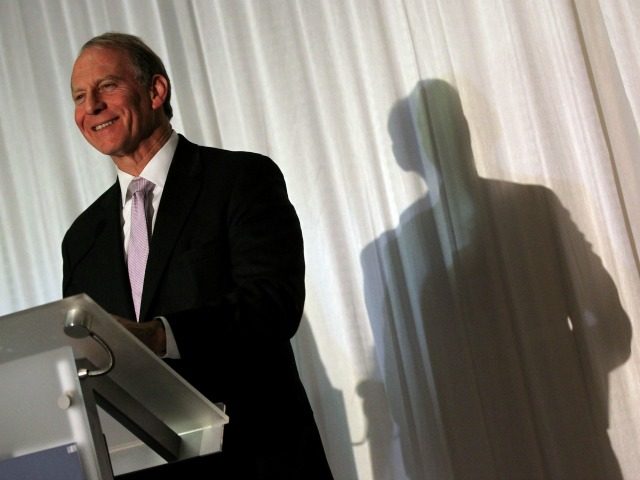Media reports suggest that President-elect Donald Trump is being pushed to nominate Richard Haass to work as the top deputy for proposed Secretary of State Rex Tillerson. But Haass would be a poor choice for at least eight reasons:
1. He’s been the president of the Council on Foreign Relations for Fourteen Years: For those unfamiliar with its work, the CFR is a think tank which is disliked for its globalist outlook by many advocates of Trump’s “America First” nationalist position. For those who are familiar with the CFR and strongly critical of it, the previous sentence will read like a considerable understatement.
For example, ardent Trump supporter Roger Stone, a onetime member of his presidential campaign, stated in July that Trump “does not want a globalist, he does not want someone who belongs to the Council on Foreign Relations, he does not want someone who is part of the Washington-New York elite” as vice-president. (Incidentally, Stone correctly listed Governor Mike Pence as one of the three top candidates for the veep slot on that occasion.)
Suffice to say that the economic-nationalist wing of the Trump base, including many of the Democrat-leaning voters he attracted in 2016, do not like the thought of seeing anyone from the council assuming a high-profile job in the Trump administration, much less its longtime president.
2. He worked for both Bush Administrations. Haass is no stranger to the State Department, having served in the early Aughts as a principal adviser to Secretary of State Colin Powell. Before that, he was on President George H.W. Bush’s National Security Council. Strong Bush associations are not a resume enhancement for many in the Trump coalition, including the aforementioned Democrat-leaning voters.
Despite having worked for Powell, Haass said in 2009 that he was “60 percent against going to war in Iraq,” and claimed he would have resigned if he had known for certain that Saddam Hussein didn’t have the weapons of mass destruction cited as one of the primary reasons for the invasion.
3. He supports open-borders trade rules, which are exemplified by the Trans-Pacific Partnership. Haass himself has acknowledged this is a significant difference of opinion he has with Trump. After Haass had a meeting with Trump in March, he told NPR he thought free trade has “been a net-plus for the United States, it’s created a lot of jobs, it’s given consumers a lot more choice, it’s driven down inflation.”
In the same interview, he said if the United States doesn’t agree to the TPP, “it would raise real questions around the world, again, as to American reliability and predictability.” Or to put it less diplomatically, he’s willing to trade Americans’ wages and jobs in exchange for a few extra bullet points in the agency’s year-end review. His brief in favor of TPP is explained in an April 2015 op-ed he co-authored for the New York Times.
4. He thinks Trump has already damaged the NATO alliance. During the campaign, Haass said Trump was “exaggerating the cost and underestimating the revenues” from membership in NATO. Trump, Haass’s potential boss, has called NATO “obsolete and extremely expensive for the United States, disproportionately so.”
5. He favors the claim that voters should hand over power to multinational governing organizations filled with globalists just like himself. So he wrote in 2006, naming climate change as one of the specific reasons nation-states “must be prepared to cede some sovereignty to world bodies if the international system is to function.”
In a 2012 commencement address, Haass argued “the future is global,” and predicted “climate change will probably alter global temperatures, sea levels, and weather patterns.” He said that our “age of globalization,” the world is inescapably defined by “large and swift flows across borders of tourists, businessmen, students, dollars, greenhouse gases, oil and gas, manufactured goods, services, emails, television and radio signals, technology, drugs, germs, weapons, terrorists, viruses, and much more.”
6. He disagrees with Trump about China policy. In the NPR interview mentioned above, Hass said he had “real differences” with Trump over China. “I do believe that the one-China policy serves American interests well,” he added.
China looks like it could be a major headache for Trump, and would have been for any other U.S. president between 2017 and 2020. Trump has been seeking to chart a different course with China, and has mused in public that the one-China policy (i.e. Taiwan is a permanent part of communist China) need not be considered sacrosanct when he negotiates with Beijing.
7. He’s part of a disturbing “path of least resistance” strategy for Trump appointments. So says Daniel Horowitz at Conservative Review, who is also strongly critical of Secretary of State nominee Rex Tillerson. Horowitz worries that “liberal” Haass is being tapped for Deputy SecState instead of former U.N. Ambassador John Bolton, much as Kris Kobach was “passed over as DHS secretary.” That process bypasses nominees who would effectively implement contentious elements of Trump’s campaign platform, but favors establishment retreads who are acceptable to liberals, globalists, and the political establishment.
8. He’s not John Bolton. This is, obviously, not a major loss for those who oppose John “American First” Bolton for Deputy SecState, who seems to be the major alternative to Haass. CNN reported Thursday on a “revolt” against Bolton brewing among some Republicans, notably including Tillerson.
Reassuringly, perhaps, that piece ended with CNN’s source inside the transition team insisting that “at no time” was the State Department job raised with Haass during his recent phone call with Trump or his meeting at Trump Tower with transition officials. Haass himself said the same thing in an NPR interview on Monday morning, and frankly didn’t sound thrilled by the prospect of becoming Deputy Secretary of State. With any luck both Haass and Trump agree on one major issue — that Haass would not be the best No. 2 at Trump’s Department of State.

COMMENTS
Please let us know if you're having issues with commenting.